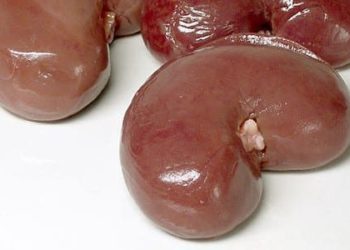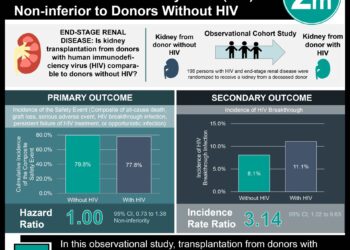Mild hypothermia for deceased organ donors reduces the rate of delayed graft function in renal transplants
1. The rate of delayed graft function in kidney transplant recipients is significantly reduced by hypothermia prior to implantation.
2. Kidney transplant recipients that benefit most from hypothermia prior to implantation are those from the “expanded-criteria” donation category.
Evidence Rating Level: 1 (Excellent)
Study Rundown: Therapeutic hypothermia has been previously shown to have neuroprotective effects in post-arrest and stroke patients. Some of these patients that do not regain neurologic function eventually become organ donors. The theoretical benefits of hypothermia include reducing metabolism as well as free radical production; however, it is widely debated whether these effects actually have clinical significance when it comes to management of donor organs.
This study randomized donor organs from declared deceased patients as per neurologic criteria into mild hypothermia (34-35 degrees Celsius) or normothermia (36.5-37.5 degrees Celsius) prior to implantation. The primary outcome of delayed graft function – defined as recipients requiring dialysis within 7 days after transplantation – occurred in only 28.2% versus 39.2% (hypothermia vs. normothermia, odds ratio=0.62, p = 0.008). Secondary outcomes included individual organ transplant in each treatment group and the total number of organs transplanted in each donor.
Since donor intervention frequently occurred before organ allocation, there was a statistical difference in cold-ischemic time noted between the hypothermia versus normothermia groups (p=0.02). This could potentially explain the difference seen between the groups. Furthermore, the protective effects of hypothermia noted in this study are only applicable to recipients of renal transplant since cooling could also impair function in other organs being considered for donation in the same deceased body. However, this study provides valuable insight into how interventions in the donor (before implantation) can preserve graft function downstream in transplant recipients. The effects of hypothermia in long-term graft function will be a future area of interest.
Click to read the study, published today in NEJM
Relevant Reading: Brain arrest: the neurological determination of death and organ donor management in Canada
In-Depth [randomized controlled trial]: This was a prospective multicenter randomized trial. It was terminated early due to the overwhelming benefit of hypothermia on reducing delayed graft function in kidney transplant recipients. At termination, the primary endpoint of delayed graft function occurred in 79/280 (hypothermia; 28.2%) versus 112/286 (normothermia; 39.2%) (p = 0.008). Subgroup analysis including the expanded-criteria donors reported a 31.0% delayed graft function in the hypothermia group compared with 56.5% in the normothermia group (adjusted odds ratio, 0.31; 95% CI, 0.15 – 0.68; p = 0.003). Therefore, renal grafts from expanded-criteria donors and other high-risk subgroups benefited from hypothermia.
The study is limited by the fact that the healthcare provides of the donors were aware of the group assignments. However, the transplantation centre was different from the centre the donor was treated which aided in blinding the group assignment.
Image: PD
©2015 2 Minute Medicine, Inc. All rights reserved. No works may be reproduced without expressed written consent from 2 Minute Medicine, Inc. Inquire about licensing here. No article should be construed as medical advice and is not intended as such by the authors or by 2 Minute Medicine, Inc.







